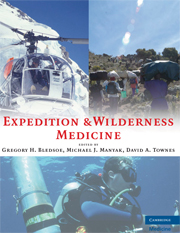Foreword
Published online by Cambridge University Press: 05 March 2013
Summary
As we travel along life's sometimes convoluted and perilous path, we've always had one thing in common with our ancient ancestors: a desire to explore new territories. Whether to exploit natural resources, conduct research, or enjoy recreation, many of us still need to travel, explore, or seek outdoor adventure.
Natural survival of the fi ttest ensured an average life span much shorter in earlier days, and losing a few Vikings on trips was probably tolerated. Sailors were unaware of why they suffered from scurvy. If General Nobile had access to this textbook, his men may have survived their Arctic balloon crash depicted in The Red Tent. Today, we require permits and insurance to travel remotely, and everyone expects to come back alive!
However, life expectancy has increased and fi eld medical care has improved considerably with better access to medicines, vaccines, and rapid transport. Before I fi rst went to Africa in 1957 to produce a wildlife documentary that included an unwounded lion charging directly into camera, I was advised to consider having my appendix removed or learning to operate on myself in case it became infl amed. My choice was to have a former veterinarian turned missionary 200 miles away do the job if necessary. Today, I could consult this book on expedition medicine to prepare for such problems and potential evacuation.
My personal concerns in Africa were minimized when the expedition leader was bitten on the thumb by an Egyptian cobra and then, a few weeks later, temporarily blinded by a spitting cobra.
- Type
- Chapter
- Information
- Expedition and Wilderness Medicine , pp. xvii - xviiiPublisher: Cambridge University PressPrint publication year: 2008



